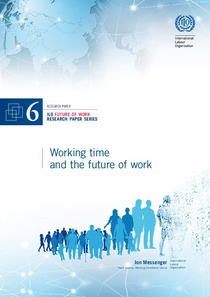Working time and the future of work
"This paper reviews trends and developments in both hours of work and the organization of working time (working time arrangements) and considers their implications for the future of work. Since the Industrial Revolution there has been a downward trend in hours of work (in those countries with l...
| Main Author: | |
|---|---|
| Institution: | ETUI-European Trade Union Institute |
| Format: | TEXT |
| Language: | English |
| Published: |
Geneva
2018
ILO |
| Subjects: | |
| Online Access: | https://www.labourline.org/KENTIKA-19303873124911210559-Working-time-and-the-future-of.htm |
| Summary: | "This paper reviews trends and developments in both hours of work and the organization of working time (working time arrangements) and considers their implications for the future of work. Since the Industrial Revolution there has been a downward trend in hours of work (in those countries with longitudinal data on working hours), which moved in tandem with increases in wages and productivity – creating a virtuous cycle. In recent decades, however, this trend has ceased or even reversed in some cases. This has been accompanied by a bifurcation of working hours, with substantial portions of the global workforce working either excessively long hours (more than 48 hours per week), which particularly affects men, or short hours/part-time work (less than 35 hours per week), which predominantly impacts women. Regarding the organization of working time, there has been a diversification in working time arrangements, with a movement away from the standard workweek consisting of fixed working hours each day for a fixed number of days and towards various forms of “flexible” working time arrangements (e.g. new forms of shift work, hours averaging, flexi-time arrangements, compressed workweeks, on-call work) along with demands for extended and even 24/7 availability, with widely divergent effects depending on the specific arrangement. The other key emerging issue regarding the organization of working time concerns the impact of new information and communications technologies (New ICTs), such as smartphones and tablet computers, which enable constant connectivity. These New ICTs have resulted in a blurring of the boundaries between paid working time and both the times and spaces that are normally reserved for personal life. The paper raises a question as to whether, given the impacts of recent technological developments on employment, the resumption of the historical trend towards an overall reduction of working hours has become an economic and a social imperative. This would require public policies promoting the reduction of working hours, particularly for those workers working excessively long hours, as well as some basic guarantees regarding minimum working hours for those working in part-time jobs with very short hours. Such policies need to be combined with both policies and practical guidance regarding how to develop balanced working time arrangements that ensure minimum periods of rest, including paid leave, and can benefit both workers and enterprises." |
|---|---|
| Physical Description: | 35 p. Digital |

